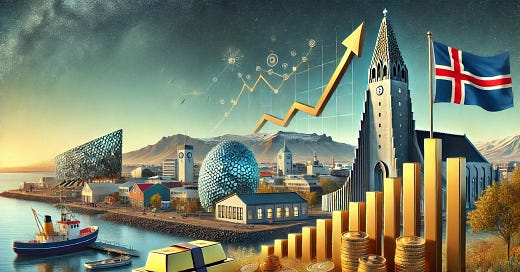Unlock Your Financial Potential! Connect with us for a one-on-one discussion. Click now to schedule your introductory call.
How do you like the content? Please let us know in the comments below
Iceland, known for its stunning landscapes and strong commitment to renewable energy, has become a global leader in sustainable development. Its economy, heavily influenced by tourism and fisheries, is navigating challenges like inflation while benefiting from a resilient labor market. As Iceland continues to attract global attention, Let delve into Iceland’s key industries and market trends.
From Volatility to Stability
Iceland is famous for its breathtaking landscapes, including geysers, glaciers, and waterfalls, which attract tourists from around the globe, leading to a 21% increase in tourism revenue in 2024. The country also excels in renewable energy, generating nearly all its electricity from geothermal and hydro sources, positioning itself as a leader in green innovation.
Over the past decade, Iceland has transformed its economy following the 2008 financial crisis, focusing on tourism, renewable energy, and fisheries. In 2023, the economy grew by 4.1%, supported by strong exports and public spending, although growth is expected to slow to 1.9% in 2024, according to the Iceland Chamber of Commerce.
Key Sectors: The Backbone of Iceland’s Economy
Tourism and Hospitality: Tourism remains a cornerstone of Iceland’s economy, contributing significantly to GDP and employment. The sector has rebounded strongly post-pandemic, with tourist arrivals increasing steadily.
Renewable Energy: Iceland is a global leader in renewable energy, with almost 100% of its electricity generated from renewable sources such as geothermal and hydroelectric power. This sector not only ensures energy security but also positions Iceland as a pioneer in sustainable energy solutions.
Fisheries: The fishing industry is another key pillar, contributing substantially to exports and employment. Iceland's rich fishing grounds make it one of the largest exporters of fish and seafood products in the world.
Finance and Technology: While the financial sector has been cautious in its recovery, technology and innovation are emerging as promising growth areas. Investments in tech startups and digital infrastructure are fostering a more diversified economy.
Economic Challenges and Outlook
Iceland faces several economic challenges despite strong sector performance. Inflation remains high, influenced by global factors, currency depreciation, and a tight labor market, reaching 10.2% in early 2023 but expected to drop to around 5% by year-end and 4.6% in 2024. The labor market is strong, with an unemployment rate of about 3.8%, but wage pressures are rising due to recent collective bargaining agreements.
The housing market, previously overheating, is beginning to stabilize, with slight increases in real estate prices and turnover. This stabilisation is essential for ensuring financial stability and maintaining consumer confidence.
Reforms to Boost Foreign Investment and Tourism Sector
Simplification of the Investment Process: The Icelandic government has created a more attractive investment environment through the Invest in Iceland initiative, which offers detailed guidance and streamlined procedures for setting up businesses. A practical example is the recent influx of data centers established by companies like Verne Global and AtNorth, attracted by Iceland's ease of doing business and competitive tax structure. These data centers leverage the country's renewable energy resources, making their operations both cost-effective and sustainable.
Enhanced Tourism Infrastructure: The expansion of Keflavik Airport, which now handles over 10 million passengers annually, is a testament to Iceland’s commitment to bolstering tourism. This development has facilitated the entry of new airlines and increased direct flights from major global cities. For instance, PLAY Airlines have expanded their routes significantly, enabling better connectivity and convenience for travelers, which in turn has boosted tourism revenue and job creation in the hospitality sector.
Renewable Energy Incentives: Iceland's focus on renewable energy has attracted global giants like Rio Tinto, which operates an aluminum smelter powered entirely by Iceland's renewable energy. This investment not only provides significant employment opportunities but also positions Iceland as a global leader in sustainable industrial practices. Moreover, companies like Carbfix are using Iceland as a base for innovative carbon capture and storage technologies, benefiting from governmental support for green energy initiatives.
Stock to Watch Out For and MSCI - Iceland Index
Marel hf (MAREL) specializes in providing advanced equipment, systems, and services for the food processing industry, particularly focusing on poultry, meat, and fish industries.





